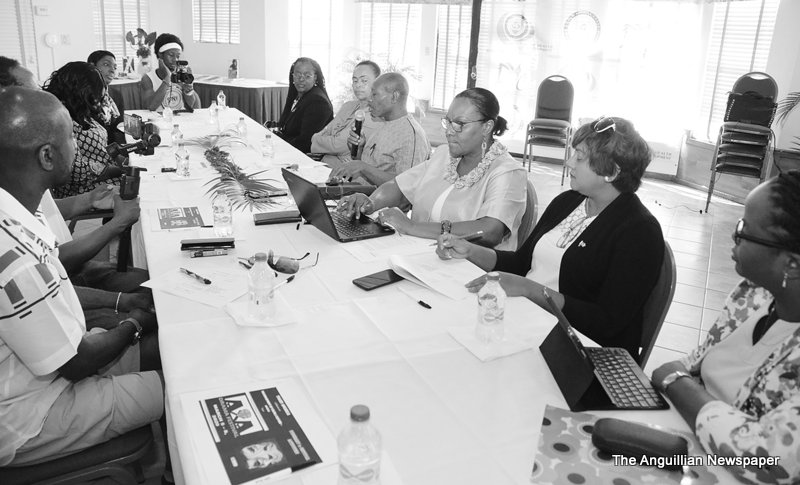On Friday, March 6th, the drama company STAGES Anguilla, in collaboration with the Department of Youth & Culture, held a press conference, at the Paradise Cove Resort, to discuss the implications of social media as a marketing tool for the arts. In addition, discussions were held on the use of arts education as a vehicle for the teaching of core subjects in school.

Members of the panel included both local and regional educators and arts enthusiasts: Head of Music at ALHSC, Mrs. Kimba Southwell; local Entrepreneur/Activist Mrs. Janine Edwards; Playwright, Ronald Hollingsworth of Guyana; Actress Lylah Persad of Trinidad; local Education Consultant, Mrs. Njeri Richardson-Carty; Theatrical Director, Sheron Cadougan-Taylor of Guyana; and Barbadian Arts Teacher, Alan Springer. Mrs. Collette Jones-Chin, Director of Stages, was the moderator of the discussions.
With regard to using technology for promoting the arts, Mrs. Jones-Chin observed: “I believe that collaboration is important with the people who are involved in social media, and us who are involved in the arts because we have no time for anything else but to create. So we need to join with the persons who are knowledgeable in the technological aspect of theatre and the arts, and we look forward to them supporting us with social media apps.”
She was responding to a few comments made by Mr. Alan Springer who said: “Children are using apps like Instagram and Linkedin, but they are not actually getting themselves immersed in learning the techniques of how to tape themselves and how to post plays or the art that they create. Our children need to use technology to develop artistic ideas. I think that is the area that we need to focus on — getting children to utilize social media apps to their own advantage, productively. And as people who work in the arts, we too need to be knowledgeable in using these gadgets in developing ways of posting our plays and paintings or whatever we have to offer.”
Mr. Ronald Hollingsworth pitched in: “To go forward in this realm, we, as people of the arts, have to be organized. There are individual voices out there, but as artists we need to speak with one collective voice. Once we speak with a collective voice, we can come together and formalize policies. Policies are important. We spend a lot of time talking, but we must devise policies. If we are to bring people on board, and show them what we in the arts are creating from our ideas, we need to let them know that policy is in place to utilize technology as a marketing tool to promote our artistic or theatrical creations.”
Mrs. Kimba Southwell made her contribution as follows: “On the matter of the use of social media for promoting the arts, we spoke about the need for children to utilize technology for the benefit of marketing the arts. However, we must take note of the fact that many adults are not inclined to use social media. Many adults lack the knowledge of what social media is all about. When we look at Facebook, it is important to realize that Facebook was not created primarily for leisure but for business. So we have to begin an education process to sensitize both adults and children on how to use social media for the purpose of promoting the arts.”
Mrs. Janine Edwards observed that social media is with us but we are not leveraging it to the fullest. “A group like STAGES, she said, “does workshops on various aspects of the arts all the time. We do stage technique, voice patterns and so on, but we can also add an element of social media training so that the youth within the group, who are already ‘high-tech’ and familiar with technology, they can learn to use the tools in order to promote the arts. In that way there can be a ready solution to taking the arts to social media — through training our youth.”
Ms. Lylah Persad sanctioned Mrs. Edwards view by saying: “When we look at Superwoman, for instance, with millions of views, they generally talk about various topics online. If we can get the youth involved in creating a play, and knowing how to put it out there in a fun way like the Superwoman show, it will excite their imagination. And I do believe in educating parents/adults as well, because that is a major problem. Some adults seem to be afraid of using social media. They only see the negative aspects of the technology. So there is one thing to educate the children, but we also have to find a way to educate the parents.”
- Staff Reporter, James R. Harrigan







